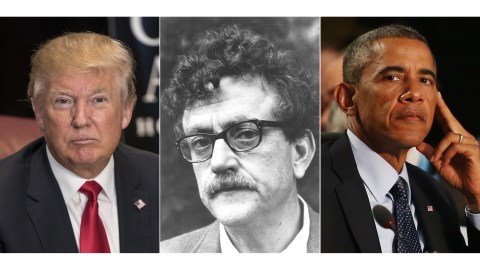Understanding the Obamacare Repeal, via Kurt Vonnegut

The Trump administration just unveiled its health care plans. Tom Price, a physician and member of Congress for the state of Georgia, is the U.S. Secretary of Health and Human Services.
While his actions have been scrutinized for possible violation of congressional ethics codes before, there is a new question being raised by many people; can he maintain his commitment the Hippocratic Oath while still carrying out orders to end the Affordable Care Act, also known as Obamacare?
For those who need a refresher, the Hippocratic Oath is taken by all doctors as a rite of passage upon becoming certified, and is often summarized by the phrase “Do no harm”. Variations of it were heard recited in ancient Greece by new doctors in the name of the Gods, and it is commonly held to have been composed by the father of western medicine, Hippocrates.
Legally, it has no power; breaking it doesn’t mean anything itself. The reciting of the oath is more so a tradition, a personal promise made when you take up the mantle of ‘doctor’ to always help those in need.
The question was raised as to how far it goes in deciding what a doctor can and cannot do in the state of Georgia. When a group of doctors tried to have a fellow doctor’s license taken away for actively participating in an execution, the state’s response was to make a law protecting such participation as being consistent with holding a doctor’s license.
Some medical students, who have organized into a group called Protect our Patients, have objected to the Trump administration’s repeal of the ACA without a suitable replacement ready to go on the grounds that the effect would be to do harm – that which they have sworn against. Seeing the head of the department in charge of the removal of the law being one of their own makes it even more heated for the students.
Before the comments section gets too infuriated, the nonpartisan Congressional Budget Office shows that the repeal without replacement of Obamacare would leave tens of millions uninsured, along with a slew of other economic issues arising as well. It is a fact that repealing the ACA without a replacement will cause many people to suddenly lack quality health care.
The concerned physicians raise the vital question of how far a person’s responsibility goes when an action that they take causes harm, suffering, or pain later. Even if they did nothing directly.
Kurt Vonnegut offered us an excellent illustration of this problem in ‘Look At the Birdie‘. Suppose you were to toss a cat over a high wall, only to have it land on another person’s head. Would you be responsible if it was to scratch their face up? Many people would say yes, at least to some extent.
But what if the cat landed on the ground and then attacked somebody an hour later? Are you still at all responsible? Remember, the wall was quite high, and you made the cat go over it. Many people see this as a different question, and insist that the cat tosser is not responsible at all here.
We could make the question a little more intensive. Suppose a child is inspired to become an ER doctor after the murder of his parents. He goes on to save many lives over the course of his career. Is the person who killed his parents also responsible for the good actions of the boy? After all, he did start the process that lead to the lives saved, even if it came at a small cost. That is where measuring consequences becomes tricky. How do you count everything? Do you hold everybody who participated responsible in some way?
In the event that Obamacare was repealed, and Dr. Price took a large role in that repeal, the question could be asked: is he participating in an action that will cause harm later, and does that mean that he is liable for it in any way? People who think the two cases above are very different say no, he isn’t. Those who think them similar would say that he will cause harm in the process, and is bound by honor to not do it.
Can a physician help take away people’s health care without violating the “Do no harm” aspect of their oath? Is the oath worth the paper it is read off of? Does Dr. Price run the risk of violating the oath by collaborating with the new administration in the repeal of Obamacare? The answer depends on how far out from an action you think responsibility for consequences follows.
Yale psychologist Paul Bloom believes policy should not be decided by appeals to the emotions of voters, but by hard data:





